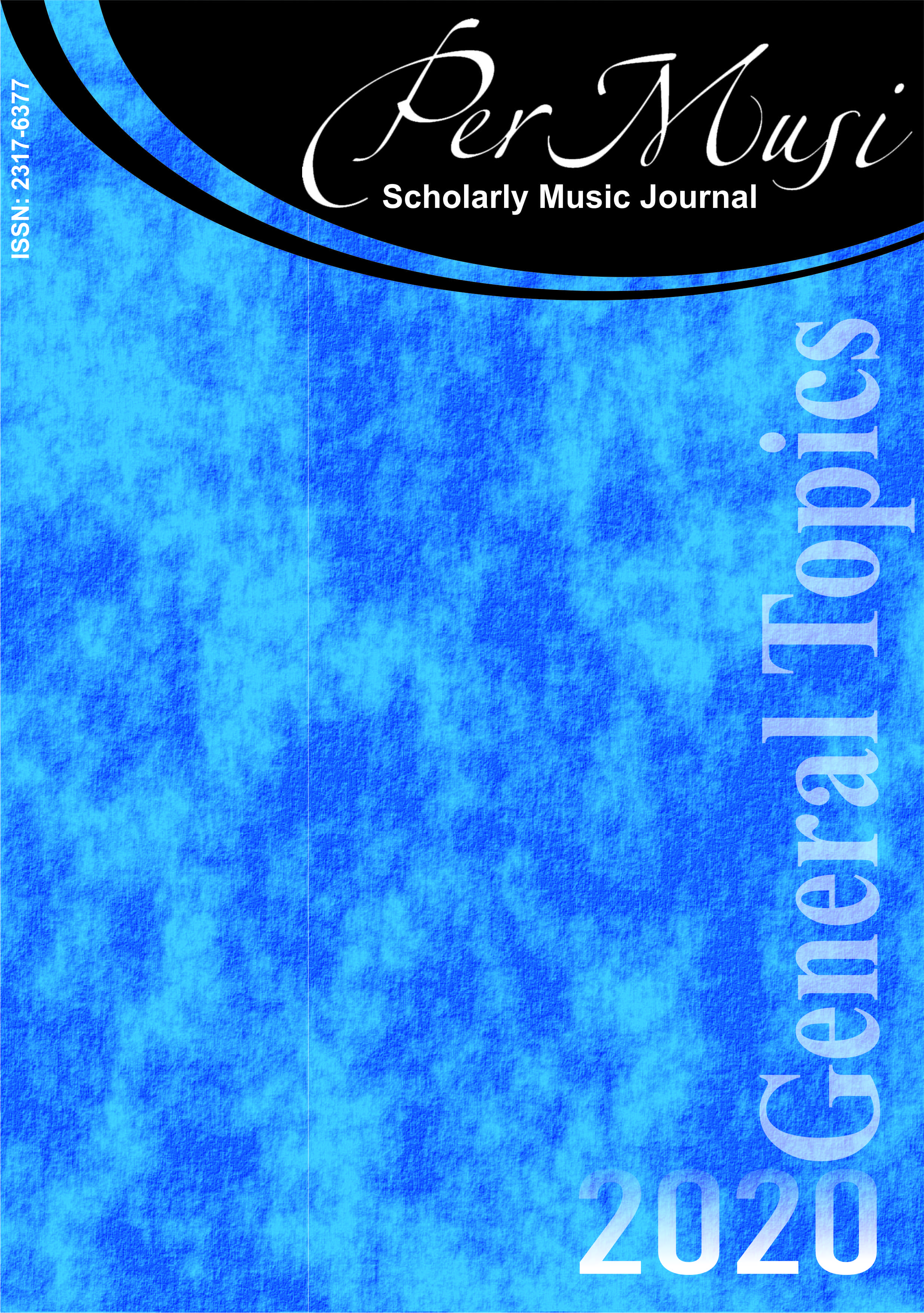Estudo populacional com regentes brasileiros sobre sua ocupação e a relação com aspectos de saúde
DOI:
https://doi.org/10.35699/2317-6377.2020.19593Palavras-chave:
Regência (Música), Saúde ocupacional, Doenças profissionais, Fatores de riscoResumo
Este texto apresenta resultados de um estudo seccional com regentes brasileiros em atividade. Foi realizada uma coleta de dados on-line através de um questionário e instrumentos de avaliação autoaplicáveis com o intuito de investigar aspectos da formação, trabalho e impacto na saúde da atividade de regência dos participantes. Os resultados indicam problemas na formação quanto a aspectos de saúde e a maioria percebe que os locais de atividades que utilizam não são satisfatórios. Os regentes percebem que seu trabalho tem impacto negativo respectivamente sob o aspecto psicológico, físico, vocal e auditivo. A percepção de dor associada à regência teve prevalência significante na região dos ombros, pescoço e região dorsal e lombar. Foi detectada associação entre as queixas e prevalência de dor com características específicas do trabalho, o tipo de conjunto em que os regentes atuam e a utilização de pódio e piano. Como conclusão o estudo aponta a necessidade de uma avaliação do currículo nos cursos de regência quanto à existência de conteúdo sobre saúde e a necessidade de oferecer aos regentes soluções para os problemas inerentes ao trabalho.
Referências
Albuquerque, Flávia M. O. de, e Elirez Silva. 2003. “Saltos altos e artralgias nos membros inferiores e coluna lombar”. Fisioter Brasil 5 (1): 18-21.
Averill, Jenn, e Kevin Sedatole. 2011. “Posture on the Podium: A Personal Trainer Assesses Conducting”. The Instrumentalist 45: 26-29.
Brasil. 2015. Norma Regulamentadora de nº 15 – Atividades e Operações Insalubres. Brasília: Ministério do Trabalho, Disponível em: http://trabalho.gov.br/seguranca-e-saude-no-trabalho/normatizacao/normas-regulamentadoras/normaregulamentadora-n-15-atividades-e-operacoes-insalubres. Acesso em: 25-11-2018.
Costa, Cristina Porto. 2015. “Saúde do músico: percursos e contribuições ao tema no Brasil”. Revista Opus 21 (3): 183-208.
Fortunato, Juliana G. S., Furtado, Monique de S., Hirabae, Leni F. de Assis, e Josiana Oliveira. 2013. “Escalas de dor no paciente crítico: uma revisão integrativa”. Revista HUPE 12 (3): 110-117.
FUVEST. 2018. Fuvest 2019: Manual do Candidato. Fundação Universitária Para o Vestibular: São Paulo.
Gonçalves, Lilian S., e Kelly Silvério. A. 2009. “Aspectos vocais de regentes de corais adultos amadores”. Anais do XIX Congresso da ANPPO, Curitiba, 66-69.
Hayes, Patrick. 2013. “Noise Doses of High School Band Directors”. Journal of Band Research 49 (1): 54-62.
Hryniewicz, Lygia, Gonçalves Costa, Vianna, e Maria Amorim. 2018. “Mulheres em posição de liderança: obstáculos e expectativas de gênero em cargos gerenciais”. Cadernos EBAPE 16 (3): 331-344.
Jaque, S. Victoria., Karamanukyan, Isabel H., e Paula Thomson. 2015. “A Psychophysiological Case Study of Orchestra Conductors”. Medical Problems of Performing Artists 30 (4).
Kella, John. 1991. “Medicine in the Service of Music; Health and Injury on the Podium”. Journal of the Conductors Guild 12 (1-2).
Klickestein, Gerald. 2009. The Musician’s Way: A Guide to Practice, Performance, and Wellness. Oxford: New York.
Lopes, Antonio Carlos. 2016. Tratado de Clínica Médica. Rio de Janeiro: Roca.
Rehder, Maria Inês Beltrami Cornacchioni, Behlau, e Mara Suzana. 2008. “Perfil vocal de regentes de coral do Estado de São Paulo”. Revista CEFAC 10 (2): 206-217.
Rocha, Ricardo. 2004. Regência uma arte complexa: técnicas e reflexões sobre a direção de orquestras e corais. Rio de Janeiro: Ibis Libris.
Sabioni, Cibele. 2016. “O perfil do regente que inicia coros comunitários no Brasil”. Anais do Simpósio Brasileiro de Pós-graduandos em Música, Rio de Janeiro 4(4).
VUNESP. 2018. Manual do Candidato: Vestibular 2018. Fundação Vunesp.
Watkins, John. 2007. The Art of the Conductor: The Definitive Guide to Music Conducting Skills, Terms, and Techniques. Lincoln: iUniverse Inc.
Williamon, Aaron. 2004. Musical Excellence: Strategies and Techniques to enhance performance. Oxford: New York.
Downloads
Publicado
Edição
Seção
Licença
Copyright (c) 2021 Per Musi

Este trabalho está licenciado sob uma licença Creative Commons Attribution 4.0 International License.

Exceto onde está indicado, o conteúdo neste site está sob uma Licença Creative Commons - Atribuição 4.0 Internacional.












